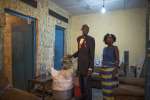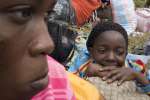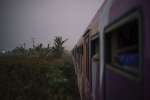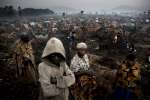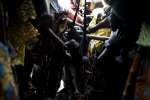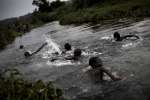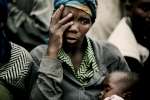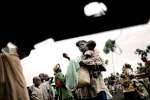- Text size
 |
|  |
|  |
| 
- عربي
Angola Repatriation: Antonio returns home after 40 years in DR Congo
News Stories, 28 August 2014
KINSHASA, Democratic Republic of the Congo, August 28 (UNHCR) – When Antonio last stood in his home village of Kwilu, Angola was a colony of Portugal on the verge of becoming independent.
A last flourish of fighting in the final weeks of colonialism, forced him to escape across the nearby border to Democratic Republic of the Congo (DRC). "Everyone was fleeing," he recalled, adding: "I fled without my parents and met them later again in Congo." That was 40 years ago, but as the independence struggle was followed by civil war, he kept on delaying his return from exile in the DRC.
Now, 12 years after the end of the civil war and two years after Angolans in the DRC and other countries lost their refugee status because of the improved conditions back home, he is finally ready to go back under a third and final voluntary repatriation programme organized by UNHCR. Not having a job has been a factor, while many taking part realize this is their last chance to get help in going back.
He is full of patriotism, feeling that his country has turned a corner. "I feel joy when I think that I will go home. It's better to be a citizen of your country than a refugee in another country," the 66-year-old said. "It is liberation. My origins are in Angola. My ancestors are born there. It's better to go back."
Antonio is one of 30,000 former refugees across the Democratic Republic of the Congo who have opted for return to Angola. Earlier this month, he was among a first group of more than 400 Angolans to return, kicking off an operation to finally end one of Africa's most protracted refugee situations. Others will be returning from Katanga province while 18,000 wish to remain and are in the process of local integration.
The day before heading off on the first leg of the journey home, a seven-hour train ride to the town of Kimpese in DRC's Bas-Congo province, Antonio spoke to UNHCR in his empty living room in Kinshasa with his wife, sister and granddaughter, who were all returning.
Their luggage, including several suitcases, plastic containers and a mattress, was packed and they were ready to start their journey back to their home in northern Angola's Uige province, one of the hardest-hit areas during the 1975-2002 civil war. The family had given the rest of their belongings to neighbours and relatives staying in the DRC.
Antonio said that when they reached the border by bus from Kimpese, he planned to first stay with an uncle in a Uige province village before returning to Kwilu. "The first thing I will have to do once home is to look for a house. I will also look for a job," he said, echoing many other returnees who cannot return to their old homes after so long.
The returnees will also need help to kickstart their lives. The Angolan government has agreed to help the returnees reintegrate.
An estimated 550,000 people fled Angola during the 14-year struggle for independence and the ensuing civil war. While most former Angolan refugees have returned since 2002, some 73,000 remain in exile, including those in the Democratic Republic of the Congo, most of whom will now go home with UNHCR help over the next few months.
Like Antonio, most are aware of the challenges but want to contribute to the continuing growth of their resource-rich country, which has enjoyed healthy economic growth since 2002, but also continues to face major social and economic problems.
"I will work for my country," insisted Antonio, who worked for a textiles company in Kinshasa before offering his services as a glazier. He acknowledged that he would need help to start with. "The state will understand us and help us in terms of housing and material assistance," he said.
His wife Albertine was looking forward most to being reunited with family members who have returned, including her elderly parents. "I have been willing to go back to my country for a long time," she revealed.
Her sister Maria, meanwhile, made a pledge before heading back to her homeland. "I will dance when we arrive at the border," she said. Eleven-year-old Faria, who was born in the DRC and whose mother died in exile, was looking forward to meeting her great grandparents and studying. "I want to become a doctor because my uncle and my aunt [in Angola] are doctors. There are many doctors in my family," she told UNHCR.
By Céline Schmitt in Kinshasa, Democratic Republic of the Congo


